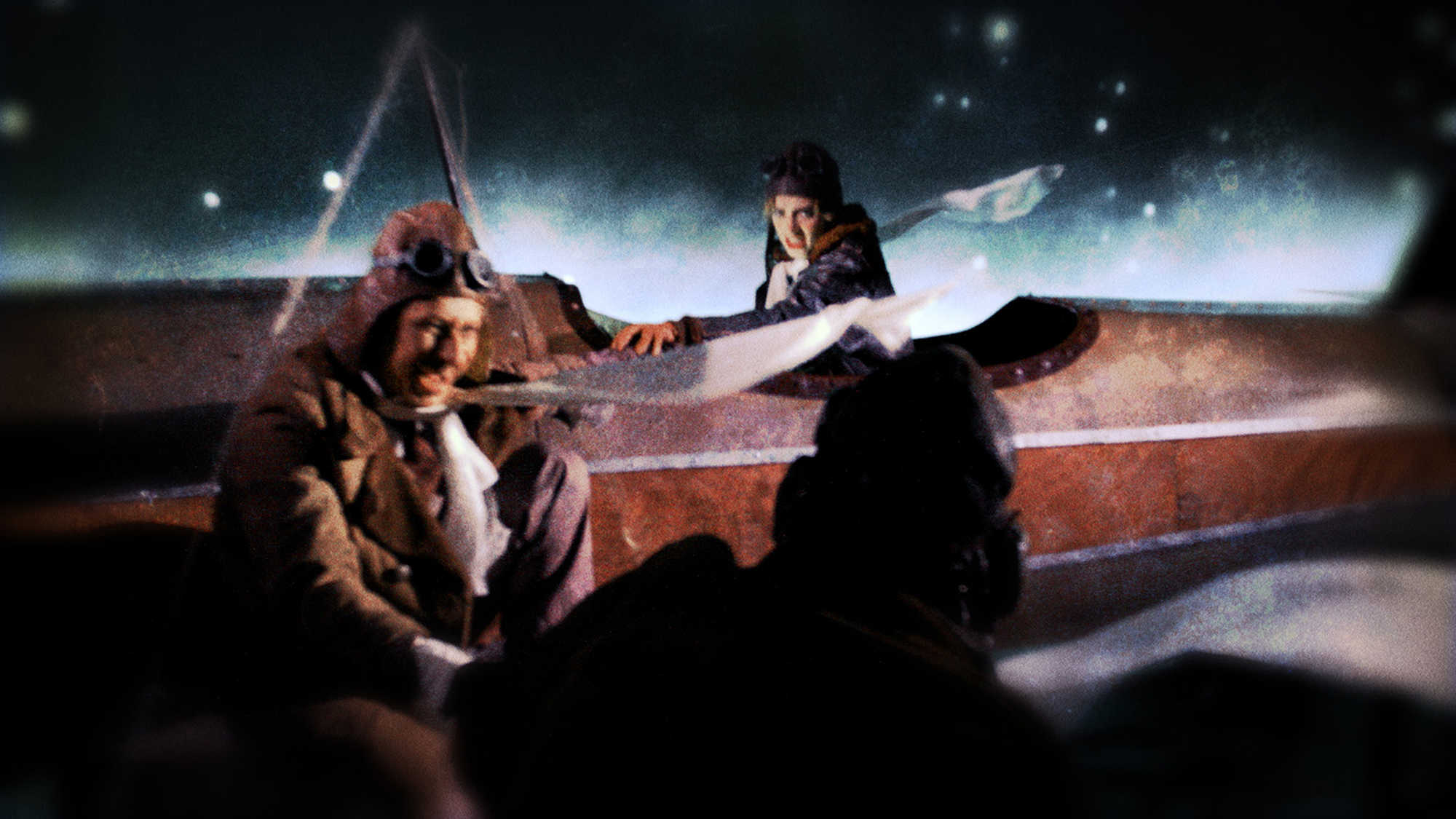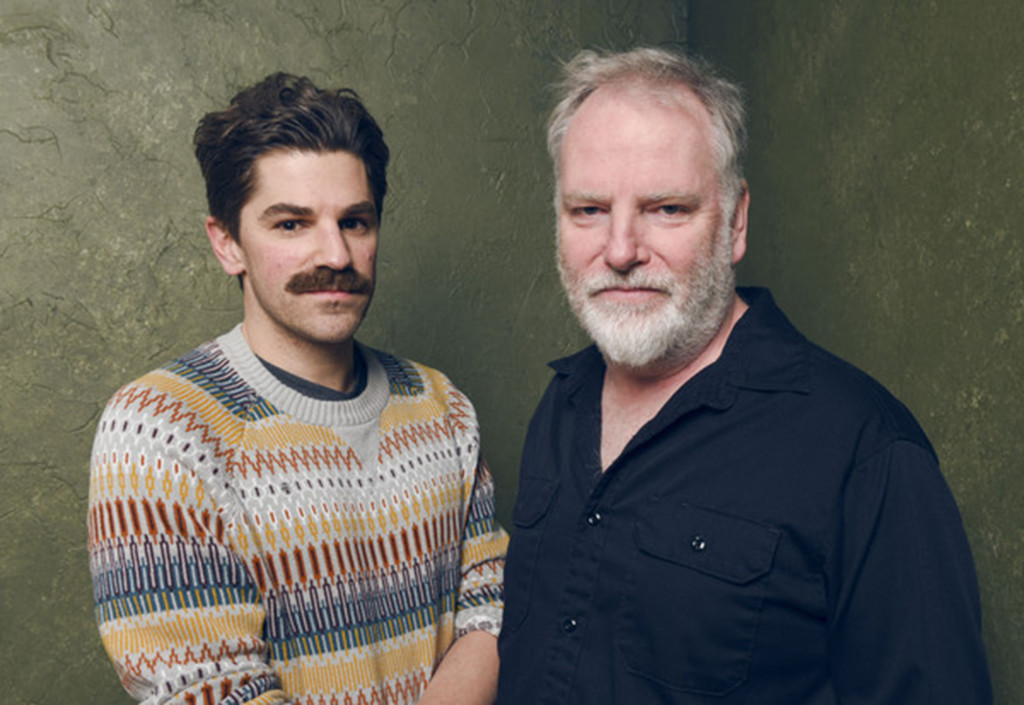Reviews include Irena’s Vow, The Beast, and Before I Change My Mind.
Interview: Guy Maddin and Evan Johnson
January 19, 2016
Beating out stiff competition from Sleeping Giant and My Internship in Canada, Guy Maddin and Evan Johnson’s The Forbidden Room was voted by the TFCA as the Rogers Best Canadian Film of 2015, making Maddin a two-time winner for the acclaim (his sly, genre-bending documentary My Winnipeg took top honours back in 2008).
It also won $100,000 from us at the TFCA.
Despite its mysterious title and esoteric aesthetic, The Forbidden Room is a fairly inviting entry point into the work of the maddening Guy. Working with collaborator Evan Johnson, Maddin’s latest is an anthology of stories unlike any other—a puzzle-box of narratives that intertwine in spectacular fashion, where punk rock meets Eisenstein. The result is a unique and heady brew of silent cinema, grungy independent work, industrial films, and grand adventure epics.

GUY MADDIN: We weren’t brave enough to say it before we won the award, but without it we would have been just so screwed. The Forbidden Room went so deep into overtime and our debts had mounted so much.
The recognition feels really great, but the actual prize money enables us to buy a few more months and get to work on our next project. We were facing all sorts of desperate scenarios had we not won the prize. So what it means is that we can keep working.
TFCA: You guys split it?
GM: We split it 3 ways, including with Galen Johnson, the production, music designer and graphic designer. He’s been working on the project for no pay for so long.
EVAN JOHNSON: He’s my brother.
GM: There’s certain inner circle collaborators that are as good as directors as far as I’m concerned – an editor is a director, Evan’s a director. Galen’s pretty close, he’s an MVP collaborator.
On a personal level, what has this award meant?
EJ: I feel legitimated slightly in the eyes of my young family now. “What are you working on, dad?” “Hmm, just this experimental film…” It was starting to feel as though I was going to have to quit and get a job.
GM: The award does legitimize. You appear in print as a winner, whether you deserve it or not. It goes a little ways with the family, that’s for sure.
EJ: I actually have worked a lot harder since winning because I suddenly feel like I’m in a ludicrouslyprivileged and even disgustingly entitled position to be coming up with stories for movies for a living. I’m taking it more seriously now, taking myself more seriously, which sounds maybe irritating for others to hear, but it’s probably better for the world if I take myself seriously.
GM: The prize money is grotesquely enormous and it probably has shamed us into working harder.
What does winning this award mean for you as Canadian filmmakers, and what does the role of the critic mean for your work?
GM: It’s really great to get some recognition, but the critics really matter to us. Not all of them – you can easily dismiss some critics – but we sort of make movies for certain critics. Not just for them, but we keep them in mind for sure. They’re our audience. I like to feel that I’ve been improving as a filmmaker. There’s been some backsliding here and there, but in general, I’m still getting better, especially thanks to Evan in recent years.
With your experimental tendencies, do you worry about accessibility for your audience? Are you concerned with slightly broadening the audience a little bit, maybe a sacrifice of the complete weirdness, in order to reach maybe a larger number of people?
EJ: Even though Guy had a long career before I showed up, I think we’re sort of in agreement about this: the experimental nature of his films comes naturally. It’s not as if Guy’s decided “I’m an experimental director, and I’m going to make films in a difficult genre that only critics will like!” It’s more that you make films you’re experimenting with the things that you love. It so happens the end result is kind of difficult for a lot of people, but it’s definitely not a deliberate difficulty.
GM: It’s a bit embarrassing, but right from the very beginning I’ve been hoping to make connections with larger audiences than I’ve ever reached. As for weird for weirdness’s sake, it’s not like I live on a steady diet of watching weird movies. Most movies that are just gratuitously weird are boring to me.
Has negative criticism of your work helped you recognize your own art better, even if you don’t necessarily agree with it?
GM: It’s actually the positive comments that I’ve gotten that have helped. People will say things like “I really love your movies because I hate narrative.” Meanwhile, all of these years I’ve been trying to write a narrative! Self-knowledge is really difficult to attain and I feel like I’ve been my best critic in many ways over the years. It sure felt like only I could diagnose what was wrong with my movies, because I sure got some really wild diagnoses. But I’m beginning to feel like I was wrong all along, and most other people were wrong and no one knew exactly what was going on. We’re really trying hard to tell [stories] more engagingly now so that people can even recognize there are stories in there. Forbidden Room in a way is a really weird digression because there’s really too much narrative in there, so we really didn’t get a chance to really burnish any one story in it.
So – do expectations of your work (and your style) fuel some of your decisions?
GM: It seems to me you just can’t win in those things. You’ve just got to make what you’ve gotta make. Take the recently deceased David Bowie – he was forever reinventing himself before the public got tired of his previous incarnation. He was in a lose-lose situation as people were always complaining about his new incarnation.
Can you please expand on Evan’s role as a collaborator?
GM: Evan’s contribution is more than just colour time. He and I were just there from the very first stirrings of the project, side by side in the writer’s room. I can’t even remember who thought of what first, but I do remember being mightily impressed. Evan was briefly just a researcher and quickly elevated to a full co-creator on it, but he led the project most of the time. Whenever I got surrealistically lazy he would sort of crack a whip in the screenwriting room. Once we were on set, I guess I was the guy who, along with the DOP, was holding a camera. Evan was doing assemblies and trying to make rough sense of it all. I really lacked mojo while shooting because this raw colour, untreated footage was really depressing to me. My old analogue cameras used to produce film footage direct from the lab with lightness and fogs and blurs and scratches that really made me feel like I was showing the world something you couldn’t see with the naked eye. You know, naked Canada! Frankly, I’m beginning to wonder what I do on these projects.
Let’s go back a bit – how is Guy “surrealistically lazy?”
EJ: Part of why Guy is a good surrealist is that his brain makes logical leaps pretty quickly, ingeniously and wildly. I don’t think other people are always willing to follow the leaps in logic and sometimes those moments show up in movies. Other times, they are motivated by something like laziness. Guy’s telling a story and sometimes he doesn’t want to go through the dreary rigor of figuring out how to get from A to B in a story using waking logic. It’s a lot quicker if you use a kind of dream or emotional logic to get from A to B. You eventually lose an audience if you pile up too much stuff. That laziness is also the source of an enormous amount of creativity in terms of Guy’s ability to compress images and ideas together really potently. So it’s a laziness, but I think the laziness of a genius. Guy probably doesn’t like the idea that I would use the word genius, but let’s say he’s just real smart.
GM: I’ll accept that flattery. There’s actually a craft in getting viewers to follow the artist’s emotions and I didn’t know that craft. I got really emotional while making Keyhole and left everyone out of my emotions. By the way, what Evan said about me was just very nice and accurate I think. It’s exactly what my Grade 1 teacher wrote on my report card. It was a very long report card, but it was that I needed to exert myself more.

In Grade 1 you were called a genius?
GM: [Laughs] Yeah, “Guy is a genius.” But then, crossed out: “very smart and needs to exert himself.
EJ: He’s a genius. F.
GM: A big fat F. See you in Grade 1 next September.
You managed to cajole some pretty amazing performers to take pretty amazing leaps in terms of narrative, including this year’s Oscar-nominee Charlotte Rampling. How do you work with the cast and getting them on board with what it is that you guys are trying to accomplish?
GM: The idea that we tricked perhaps the Best Actress winner into appearing in our project just by buying her lunch is pretty pleasing to me. There were a couple of people who fell through. Frederick Wiseman was the only person who turned us down flat. Other than that, everyone we approached said yes and that was really amazing.
I would think in some ways your films could be even more demanding of an actor, particularly if they’re insisting on understanding their part within the surreal whole.
GM: Evan and I are both amazed at actors. They seem to just trust. But a lot of actors just have to feel, they don’t have enough time to distrust. Most of them were content to be pretty confused about the overall picture. They were given a single script for a single story, so they didn’t have the whole Forbidden Room script to worry about. It’s probably almost slightly clearer on the page, although our scripts were famous for being impossible to remember, which is partly why the set fell into chaos.
EM: Well, we couldn’t remember all the stories, there were too many of them. The only times I would interject and come and talk to Guy about would be when sometimes the performance would bother me. Often a naive, young director will hear the script in a certain way in his or her head and not give the actors enough freedom. I was being like that. I ended up throwing the script down and leaving the set for a few hours because it wasn’t working.
GM: Yeah, I was going, what do you want, Evan? The guy remembered the line!

Evan, do you now think that you were wrong to want it that way? Or when you were in the editing room, did you miss having that piece that you wanted?
EJ: Well, maybe a little bit of both. I think for Forbidden Room we did what we could and it turned out as well as we could have hoped. I like all of the performances now in there because they fit what we needed the movie to be. Guy’s in a hurry on set usually, and a small part of that might be his general impatience, the impatience I spoke of earlier. But a lot of it was we had 12-13 pages to shoot in one short shooting day with multiple sets. We just didn’t have time to be careful, to have a conversation with an actor about the psychological motivation and have him or her rehearse it.
GM: I was really in a panic about working with digital colour for the first time. But I think also my willingness to shoot movies for low budgets and to shoot 13 pages a day has eventually come back to bite me in the ass. Now, it’s kind of expected of me. When shooting schedules are drawn up, the line producer will come back to me and say “good news, we got the budget balanced and we got everything to fit. You’ve got 8 days to shoot this feature.” Now that I’m armed by the critics’ decree that we made this wonderful prize-winning film, maybe we can dig in our heels and get it down to 10 pages a day or something.
Say you’re given 20 million dollars to make a film – do you have it in you? A story that mainstream?
GM: 20 million isn’t so bad. I assume that part of that 20 million would go to getting some stars, and then yeah, I think so. 20 million is the new 5 million. I used to say that I would love a 5 million dollar budget and well, actually, I would love a 5 million dollar budget right now, I’d be happy with that. And we could recoup that. I’m a guy who’s made 11 feature films now, 10 of them subsidized heavily by the Canadian taxpayer, so, but I’m up for the challenge now. I like challenges. I like assignments. A few of the movies I’ve made have been assignments – my ballet picture Dracula, my short Heart of the World, my musical spectacular Brand Upon the Brain. I like the idea of over-delivering and under-budget and things like that, so I like the challenge.




